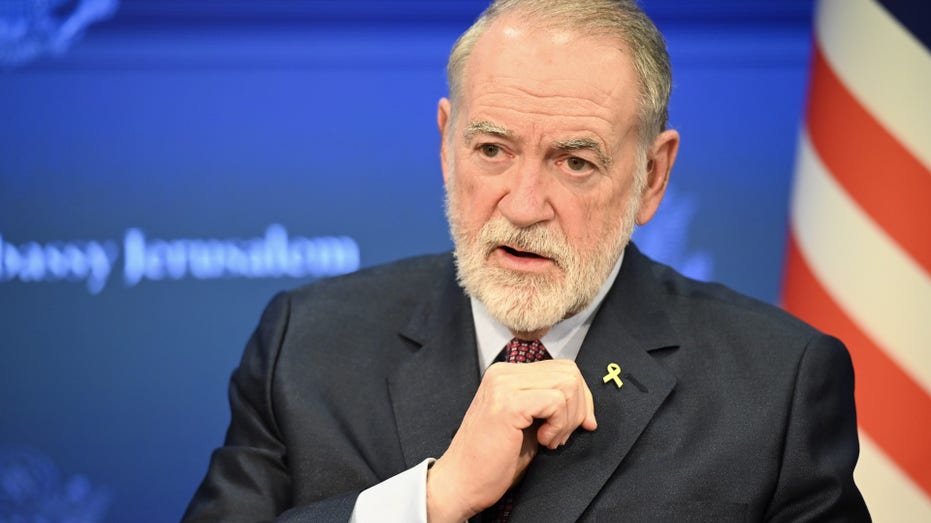Huckabee Criticizes French-Backed Palestinian Statehood Initiative at the UN, Affirms Strong US-Israel Alliance
Ambassador Huckabee warns Tehran remains a major threat while reaffirming strong U.S.-Israel ties amid France’s Palestinian state push.

The United States has decided not to participate in next month’s conference in New York City, co-hosted by France and Saudi Arabia, which is intended to promote the recognition of a Palestinian state. U.S. Ambassador to Israel Mike Huckabee described the decision as unequivocal during a recent visit to Jerusalem, calling the event “incredibly inappropriate” given the ongoing conflict between Israel and Hamas in Gaza.
“It’s incredibly inappropriate in the midst of a war that Israel is dealing with to go out and present something that I think increasingly Israelis are steadfast against,” Huckabee stated. He pointed to the October 7th attacks as a turning point, stating, “Oct. 7 changed a lot of things.” He sharply criticized outside attempts to pressure Israel on statehood issues, suggesting, “If France is really so determined to see a Palestinian state, I have a suggestion for them–carve out a piece of the French Riviera.” The ambassador said the U.S. would not participate in what he termed “such a ruse.”
Amid reports of friction in U.S.-Israel relations, Huckabee sought to reassure both nations. “I don’t think pro-Israel Americans need to be concerned that there’s some rift between the United States and Israel,” he emphasized. While acknowledging occasional policy disagreements—such as strategies concerning the Gaza war and approaches to Iran—he insisted the bilateral relationship remains resilient and essential. “It’s not a friendship, it’s not an alliance, it’s a partnership, which means we are yoked together,” he explained, highlighting intelligence and military cooperation as key elements of this bond.
On the topic of Iran, Huckabee did not mince words, describing the Islamic Republic as “one of the, if not the greatest, threats to world peace.” He warned that Iran’s ambitions represent an “immediate existential threat” to Israel, several Gulf countries, and ultimately the United States. “The Iranians have said Israel is the ‘Little Satan,’ but America is the ‘Great Satan,’” he noted, urging policymakers to take Tehran’s threats seriously—even as nuclear talks continue.
Despite skepticism about Tehran’s intentions, Huckabee expressed hope for a diplomatic solution, warning, “But when diplomacy fails, the soldiers show up.” He underscored the seriousness of the moment, saying, “It’s just important when people tell you over and over for 46 years they plan to kill you, you might want to start taking them seriously.” Nevertheless, he reaffirmed the U.S. commitment: “The president has been incredibly clear that Iran is not going to have a nuclear weapon.”
Turning to the ongoing hostilities in the Gaza Strip, the ambassador said the path to ending the suffering was clear: “All of us are hoping and praying that Hamas will finally give up all the hostages and release them, and then they will depart Gaza for good. If they do these two things, this is over.” He reiterated the Trump administration's position that Hamas has no future in Gaza, asserting that Israel has offered safe passage for the group’s leadership into exile, but insists that all hostages, living and dead, must be returned.
Expressing a personal sentiment, Huckabee said he looks forward to the day he can remove the pin representing the hostage crisis from his lapel. “One of the happiest days of my life will be when I can take this pin off and permanently put it away, never to wear it again, because that means all of the hostages have come home,” he shared.
Looking toward the future, Huckabee voiced optimism about expanding the Abraham Accords, the agreement that normalized relations between Israel and the UAE, Bahrain, Sudan, and Morocco. Without naming which additional countries might soon join, he observed, “There are a number of nations that now realize that having enmity with Israel is meaningless.” He characterized the process as delicate for some states but predicted “dramatic changes and big additions” to the accords in the near future.




